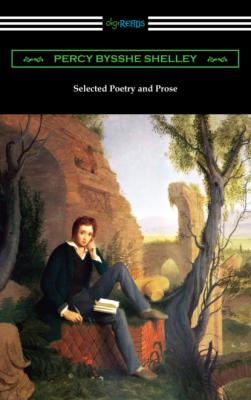Selected Poetry and Prose. Percy Bysshe Shelley
Чтение книги онлайн.
Читать онлайн книгу Selected Poetry and Prose - Percy Bysshe Shelley страница 49
 still,
still,
Which seeks “a soul of goodness” in things ill,
Or in himself or others, has thus bowed
His being—there are some by nature proud,
Who patient in all else demand but this:
To love and be beloved with gentleness;
And, being scorned, what wonder if they die
Some living death? this is not destiny
But man’s own wilful ill.’ As thus I spoke,
Servants announced the gondola, and we
Through the fast-falling rain and high-wrought sea
Sailed to the island where the madhouse stands.
We disembarked. The clap of tortured hands,
Fierce yells and howlings and lamentings keen,
And laughter where complaint had merrier been,
Moans, shrieks, and curses, and blaspheming prayers,
Accosted us. We climbed the oozy stairs
Into an old courtyard. I heard on high,
Then, fragments of most touching melody,
But looking up saw not the singer there—
Through the black bars in the tempestuous air
I saw, like weeds on a wrecked palace growing,
Long tangled locks flung wildly forth, and flowing,
Of those who on a sudden were beguiled
Into strange silence, and looked forth and smiled
Hearing sweet sounds.—Then I: ‘Methinks there were
A cure of these with patience and kind care,
If music can thus move . . . But what is he,
Whom we seek here?’ ‘Of his sad history
I know but this,’ said Maddalo: ‘he came
To Venice a dejected man, and fame
Said he was wealthy, or he had been so.
Some thought the loss of fortune wrought him woe;
But he was ever talking in such sort
As you do—far more sadly—he seemed hurt,
Even as a man with his peculiar wrong,
To hear but of the oppression of the strong,
Or those absurd deceits (I think with you
In some respects, you know) which carry through
The excellent impostors of this earth
When they outface detection—he had worth,
Poor fellow! but a humorist in his way.’—
‘Alas, what drove him mad?’ ‘I cannot say;
A lady came with him from France, and when
She left him and returned, he wandered then
About yon lonely isles of desert sand
Till he grew wild—He had no cash or land
Remaining,—the police had brought him here—
Some fancy took him and he would not bear
Removal; so I fitted up for him
Those rooms beside the sea, to please his whim,
And sent him busts and books and urns for flowers,
Which had adorned his life in happier hours,
And instruments of music—you may guess
A stranger could do little more or less
For one so gentle and unfortunate—
And those are his sweet strains which charm the weight
From madmen’s chains, and make this Hell appear
A heaven of sacred silence, hushed to hear.’—
‘Nay, this was kind of you—he had no claim,
As the world says.’—‘None—but the very same
Which I on all mankind, were I as he
Fallen to such deep reverse. His melody
Is interrupted; now—we hear the din
Of madmen, shriek on shriek, again begin.
Let us now visit him; after this strain
He ever communes with himself again,
And sees nor hears not any.’ Having said
These words, we called the keeper, and he led
To an apartment opening on the sea—
There the poor wretch was sitting mournfully
Near a piano, his pale fingers twined
One with the other, and the ooze and wind
Rushed through an open casement, and did sway
His hair, and starred it with the brackish spray;
His head was leaning on a music-book,
And he was muttering, and his lean limbs shook;
His lips were pressed against a folded leaf,
In hue too beautiful for health, and grief
Smiled in their motions as they lay apart—
As one who wrought from his own fervid heart
The eloquence of passion, soon he raised
His sad meek face, and eyes lustrous and glazed,
And spoke—sometimes as one who wrote, and thought
His words might move some heart that heeded not,
If sent to distant lands; and then as one
Reproaching deeds never to be undone
With